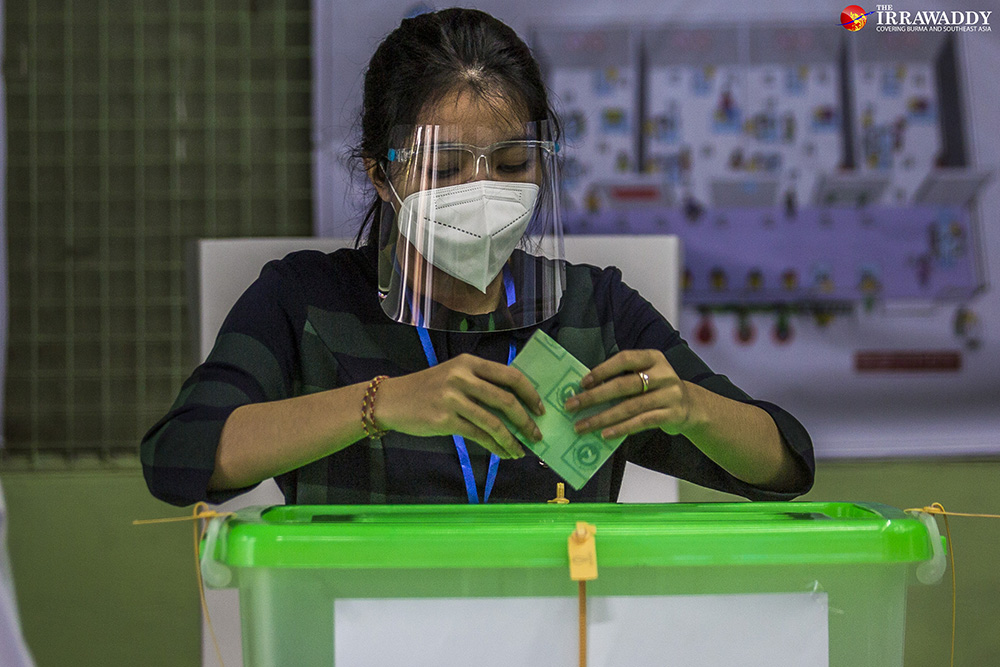The National League for Democracy (NLD) won Sunday’s general election in a landslide. That’s a simple fact. The ruling party now cruises into a second term with a resounding mandate. Many pundits and “Myanmar observers” who ventured election predictions were proved wrong, yet again.
Braving the risks to their health presented by COVID-19, millions of Myanmar people went to the polls, and despite initial fears of violence, the election went peacefully and smoothly.
Myanmar has dozens of ethnic armed insurgent groups, and we have watched the armed conflict in northern Rakhine, which serves as a base for the Arakan Army and Muslim militants (both officially condemned as terrorists) rumble on. Weeks before the election, the AA abducted three NLD candidates, who remain in custody. Nevertheless, on Election Day, there was no violence, there were no bomb blasts and there were no killings; instead, we saw mask-wearing Myanmar citizens line up and cast their votes in the millions for the NLD. This alone shows that millions of people in Myanmar seek a peaceful democratic transition for the country. The ruling party’s victory was followed by an eruption of celebrations—including, unfortunately mass violations of COVID-19 restrictions and regulations.
The outcome of the vote was obvious. The NLD won the election with an expanded majority and a strengthened mandate in the Parliament. This should petrify the NLD’s opponents, the military and those organizations invested in seeing new faces in Parliament—not to mention covert operations to discredit and bring down the government.
The fact is, the NLD and its iconic leader Daw Aung San Suu Kyi have been returned to power.
Days before the election, Myanmar military chief Senior General Min Aung Hlaing’s warning, made in an interview with local media, to the government over the Union Election Commission’s perceived incompetence only encouraged people to go out and vote.
The message is clear: people in Myanmar don’t want to see the return of the military or its proxy parties, including the formerly ruling Union Solidarity and Development Party. Ironically, the military’s warnings, and attempts by some political groups to sow volatility and confusion ahead of the election, simply pushed millions of ordinary people to go out and vote for the NLD.
Now the winning party must focus on forming a new government. But as we look to the future, we must also look to the past and correct some mistakes.
As Myanmar is an agriculture-based country, the NLD has for the past five years focused on building more roads and highways, opening up trade and creating small-scale business opportunities, improving the electricity supply and giving a much-needed boost to the health care and education sectors. The government deserves kudos for that.

In the countryside, people are indeed pleased to see visible signs of improvement in infrastructure with new roads, more electricity, and less corrupt government officials and public services. Compared to the corrupt and repressive previous regimes, the NLD government is viewed by people in the countryside as a drastic improvement.
However, there has been no shortage of criticism of the government. Critics slam its failure to nurture and cultivate activists, as well as democratic and media institutions in the country. Secondly, many have pointed to the fact that the NLD failed to place the right people in the right positions when forming a government in 2016. The targets of this criticism include some members of the party’s economic team who have guided the economic policies of the government.
Lastly, critics say the government should pay more attention to the stagnant peace process and the issue of ethnic minorities in Myanmar. Ethnic political parties won some seats in Shan, Kayah and Rakhine states, but several suffered defeats at the hands of the NLD.
This means appointing capable candidates with impressive backgrounds in peace and conflict issues to government bodies.
In August, the fourth session of the 21st-Century Panglong Union Peace Conference attended by representatives of the government, military, ethnic armed organizations and political parties ended on a cautiously happy note. They agreed to move the country’s stalled peace process forward under the incoming government beyond 2020.
They also agreed to implement a democratic federal union-building process. Daw Aung San Suu Kyi dubbed it “a new plan for building a democratic federal union beyond 2020” in her closing remarks.
Following its electoral victory, the NLD on Thursday posted on Facebook a letter it sent to 39 ethnic parties in the country the same day, vowing that a federal union would emerge in the future, and that it would make a greater priority of ethnic people’s wishes in the future.
However, given the NLD’s neglect of ethnic parties in the past, its vow should be taken with a few grains of salt. The NLD needs to go beyond words and back them up with action, very soon.
Myanmar’s peaceful election—which went off smoothly despite misgivings and challenges due to the country’s continued surge in COVID-19 cases—was an impressive display. It’s party time for millions of voters. But as we look to the future, our optimism must be tempered with caution.
You may also like these stories:
In Myanmar, the NLD’s Main Rival Finds It Hard to Accept Electoral Defeat
Sweeping All Seats, Suu Kyi’s NLD Beats Rival USDP in Mandalay Region
Myanmar’s 2020 General Election Results in Numbers

















